Hello, brother!
On a very good site (and part-time forum) Polygon Ghosts , dedicated to the history of computer technology, held the next article contest, in which I decided to take part. Under the cut to your attention this article - review of the word processor Brother super PowerNote PN-8800FXB .

Not really a laptop, but I think many will be interested, especially since there is very little information on the network.
')
Part one. "Iron".

This is a business oriented word processor. With a fairly powerful text editor, table editor, calendar, etc. (more details later in the text).

He has the form factor of an ordinary laptop.
Specifications:
- 6 MHz processor (hd64180rf6x)
- 33KB of memory
- Built-in floppy-drive, working with 3.5 "floppy disks (1.44 MB)
- 9 inch monochrome display (22 by 80 characters)
- Parallel port
- Infrared port
- Modem
- Compatibility with multimedia cards Bookman cards
The left side carries: a connector for the power supply (9V), a modem RJ11, a toggle switch and a display contrast control. It is worth noting that there is no dimmer, and the screen has no backlight.
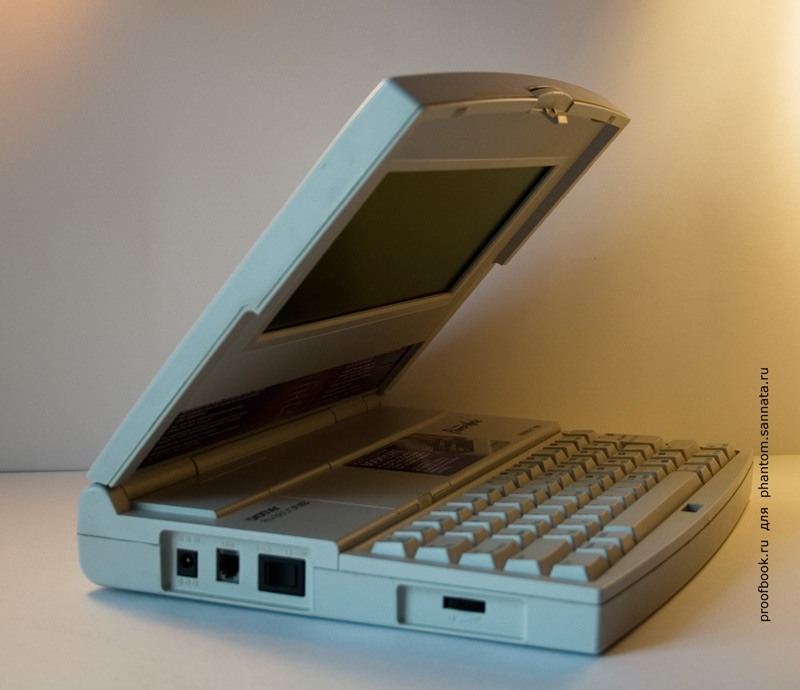
On the right fit only a floppy-drive.
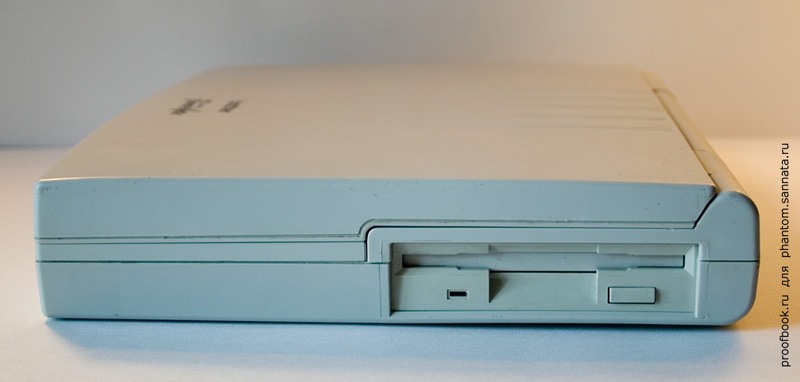
On the back under the flip cover are parallel and infrared ports.
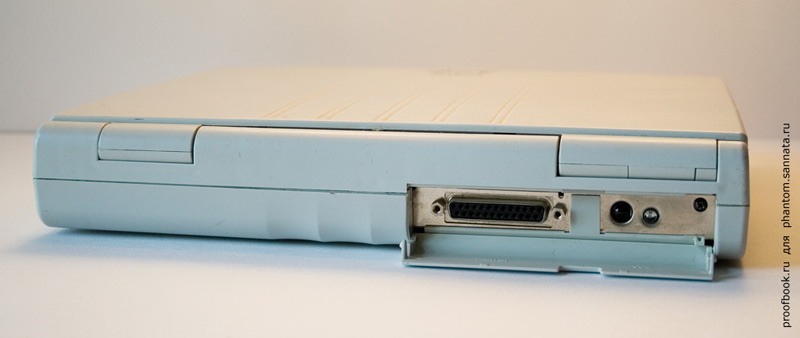
If you look closely, you can see small indentations in the body, just in the shape of fingers, for the convenience of wearing the device.
In addition to the label sticker, there are two compartments on the bottom. One for backup batteries (standard 3V CR2032). Under the second cover is a slot for Bookman cards. There may be various information on the cards (games including). Unfortunately, I do not have a card.
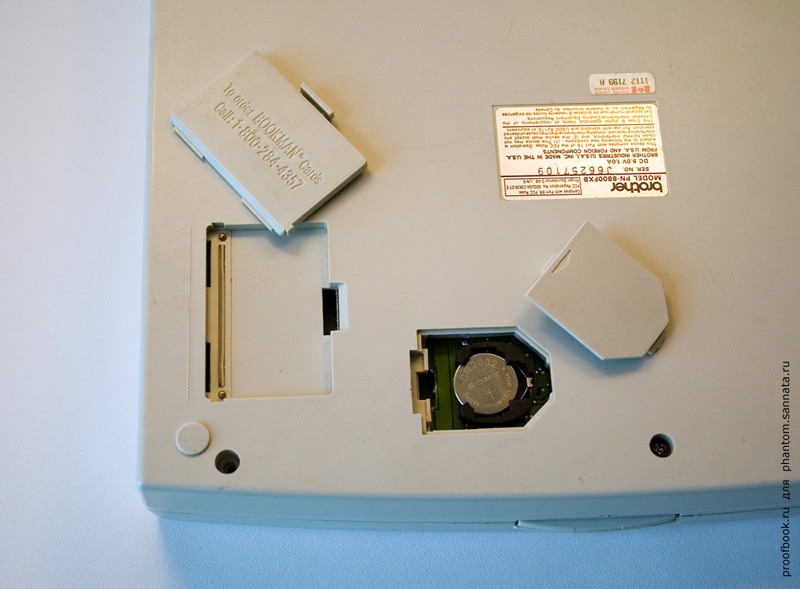
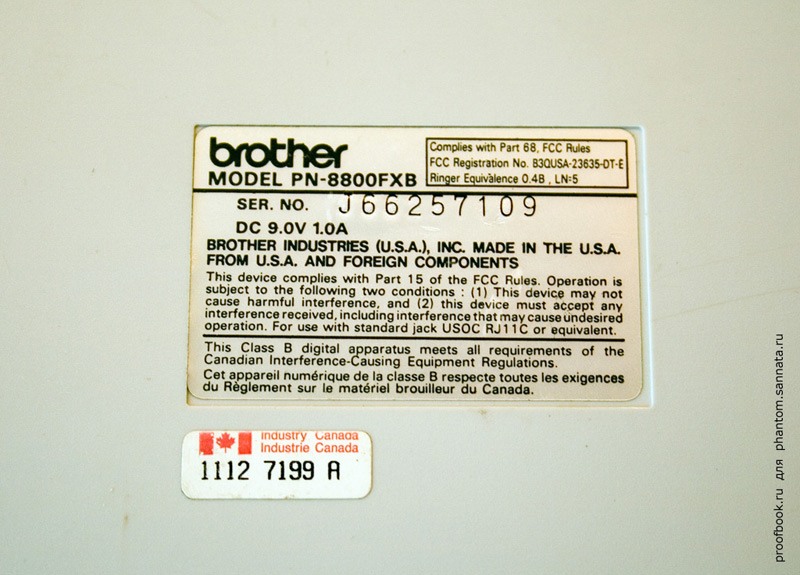
The compartment under the battery is located above the keyboard and should carry a NiCad battery with a capacity of 1400 mAh. I did not have the battery in the kit, so unfortunately I can not tell the time it allows you to use the device without access to a power outlet.
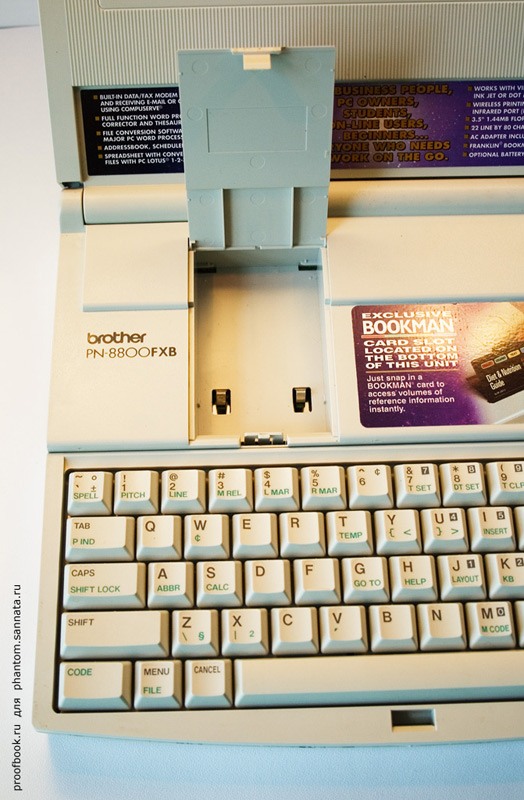
Under the display there is a large informative sticker, which lists the advantages of the “typewriter”. Frankly, the sticker adds a kind of toy to the device for the device, you know how toy notebooks are now sold to children.
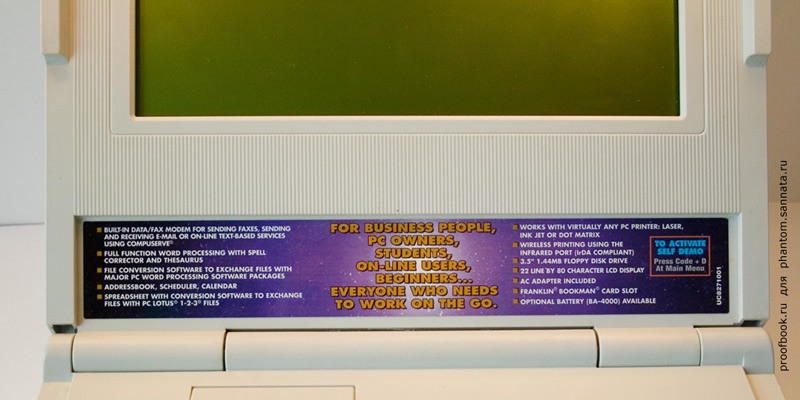
It's time to see what's inside:
Unscrew the three screws, you can remove the keyboard.
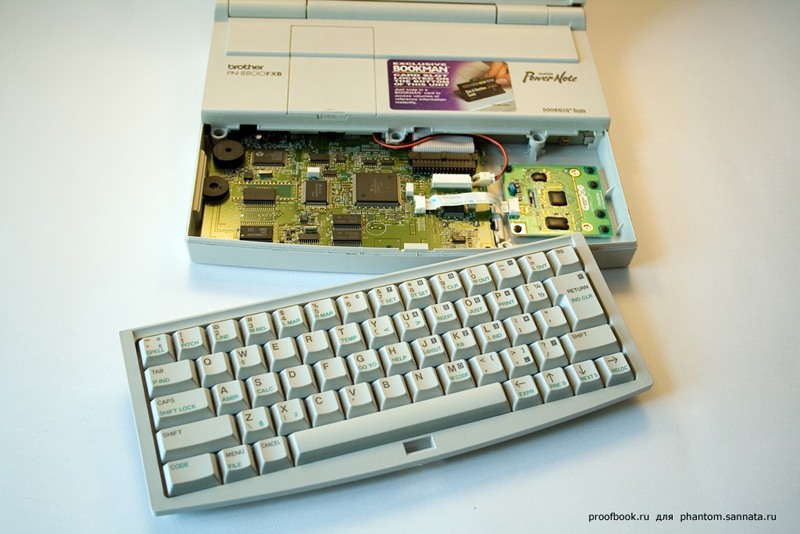
Just a couple of screws and you can remove the top cover with a display. A thin flexible loop is used to transmit the image.
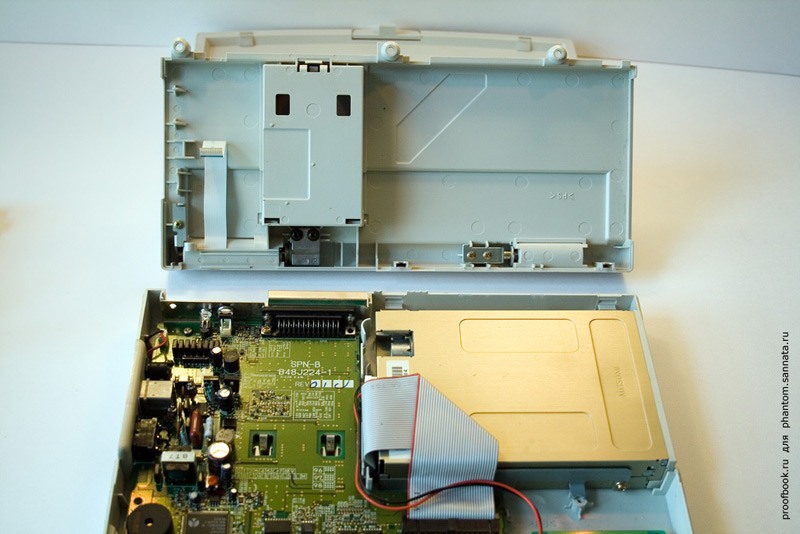
As you can see in the photo, a completely ordinary 3.5 inch floppy disk drive is used, on the motherboard classic connectors are nothing unusual.
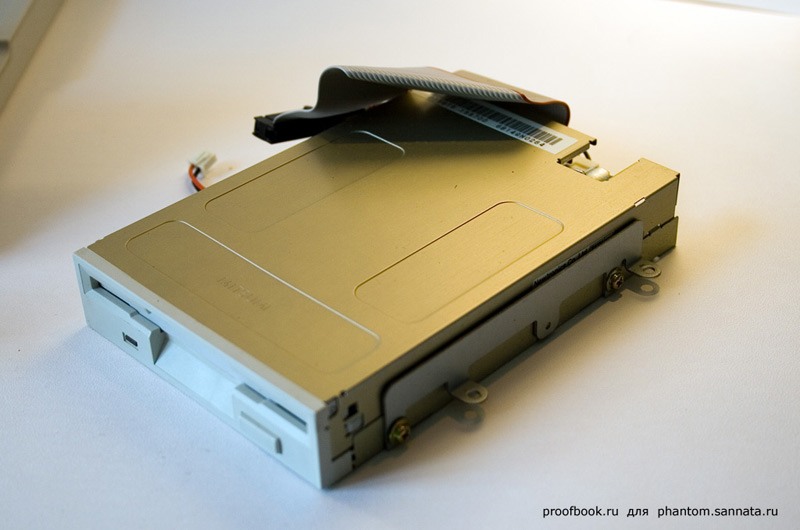
All elements are located on one side of the motherboard. Separately, the Bookman card reader board is located and is connected to the main board with a loop.
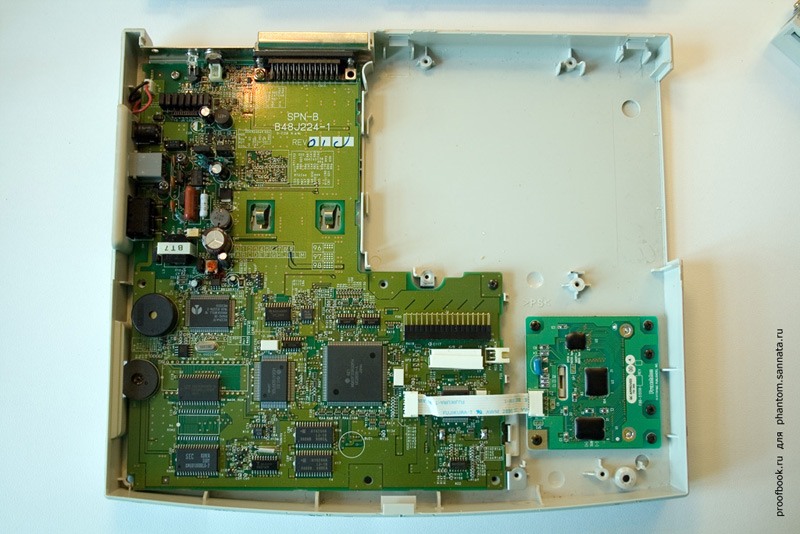
The memory is soldered on the board, no additional connectors are provided for its increase, but it probably is not necessary.
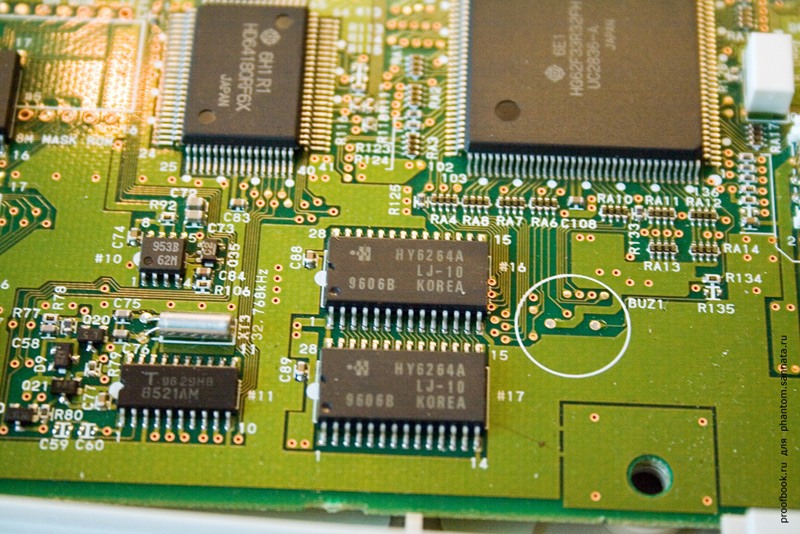
Actually processor Hitachi 64180 (a distant large chip on the board).
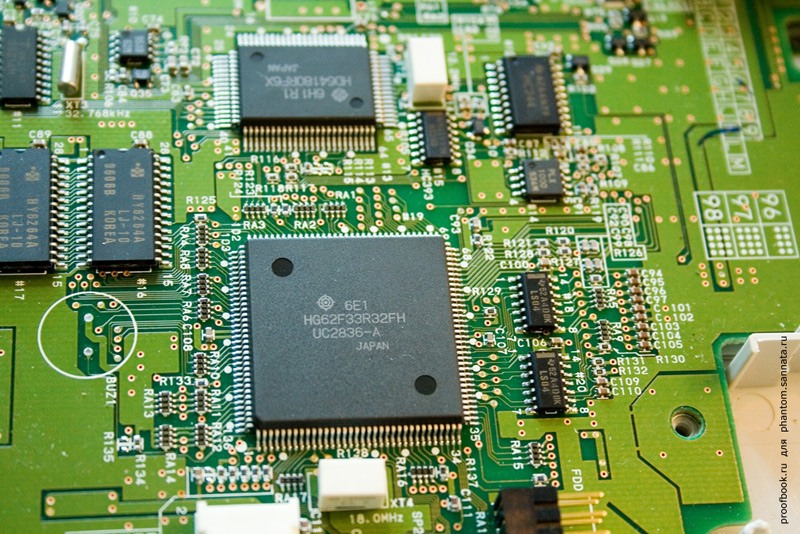
Part two. "Software".
So, after turning on the device, a greeting appears on the screen.
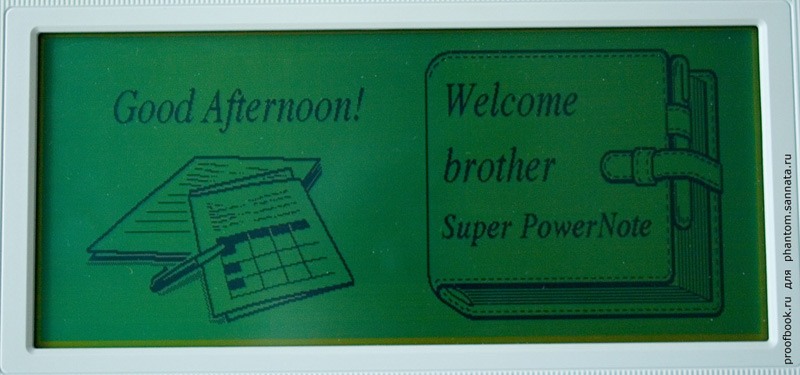
And after a quick download, the main menu is available. Because no manipulator is provided, then movement between points is carried out using the navigation keys on the keyboard (arrows). By the way, they are unusual, in a row - to the left, up, down, right. In general, the keyboard layout is familiar qwerty, there is also a Code softkey, in combination with which some keys perform additional functions. There is a Cancel key and Menu. The backspace key is marked - BS, instead of the usual arrow.
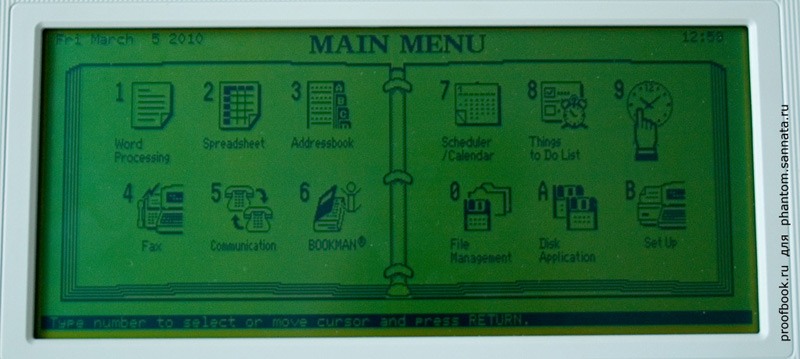
As can be seen in the screenshot, only 12 menu items. Let's go over them in a bit more detail.
Under the first point is quite a powerful word processor. There are various text formatting options, setting page sizes, copying text in blocks, go to the next page, header and footer, and more. The document can be saved in .wpt format. It can also be printed immediately.
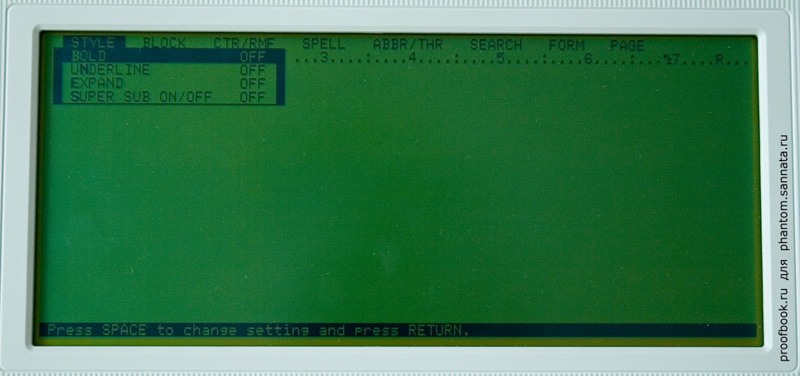
To work with a table editor, you must insert a floppy disk. Without it, the tables do not start, obviously due to the large file size. Various actions with tables are also available (sorting, etc.).

Files are saved in the .wpr format, they can also be converted to .wpt.
The next menu item is the address book. By filling out the address book, you can send faxes using contacts from it, and not enter the phone number when sending.
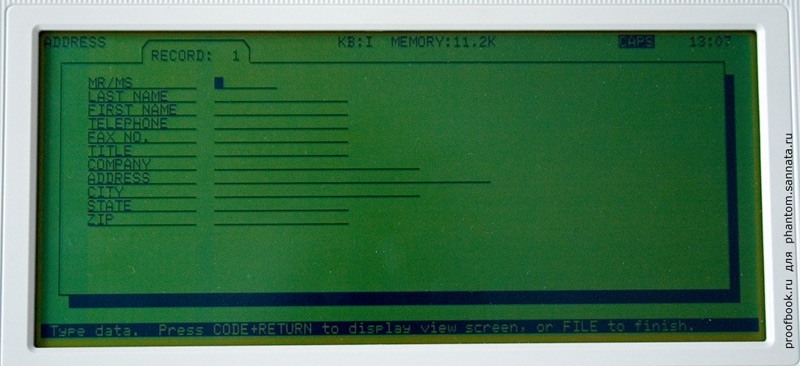
The fourth item is the fax send menu.
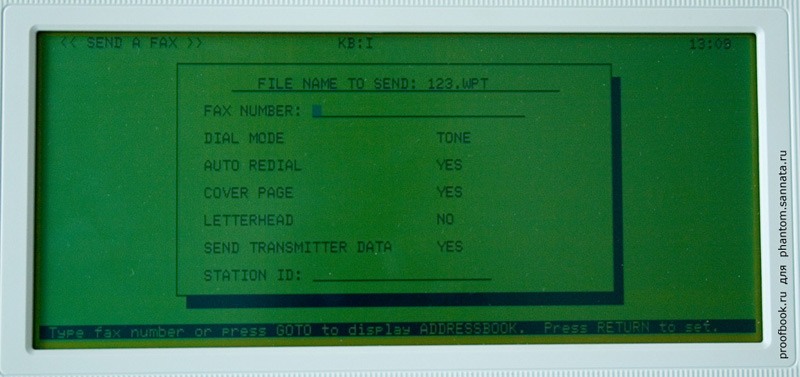
The fifth menu item is communication, where a TTY terminal and various connection settings, phone number, and file sending are available.
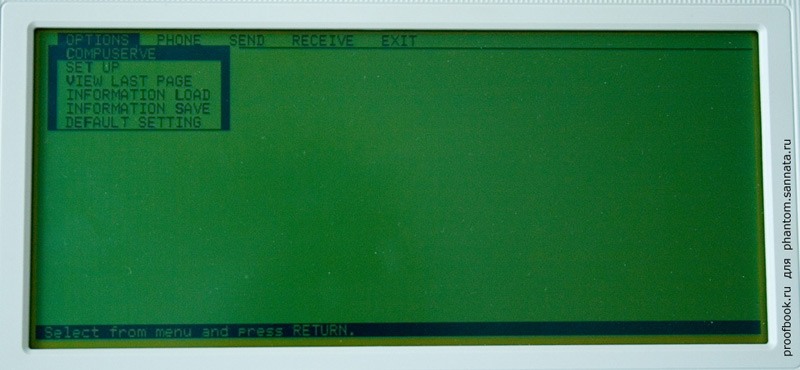
The following item is designed to work with maps bookman. Due to the lack of a card, it didn’t work out properly, the message about the absence of a card pops up, it is suggested to turn off the device and insert the card.

The seventh item is the calendar where you can add various tasks with reference to a specific date and time to within half an hour.
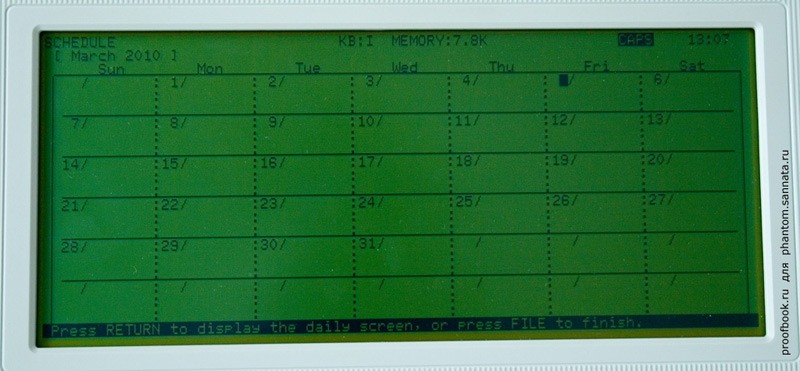
Such now popular todo lists are implemented in the eighth menu item. You can take notes, specify what needs to be done, the end date. You can also set a signal for a specific date and time.

What a business without world time, and time in general. The ninth point is dedicated to him. World time, alarm clocks, current time zone (city), date and time settings - that's it.
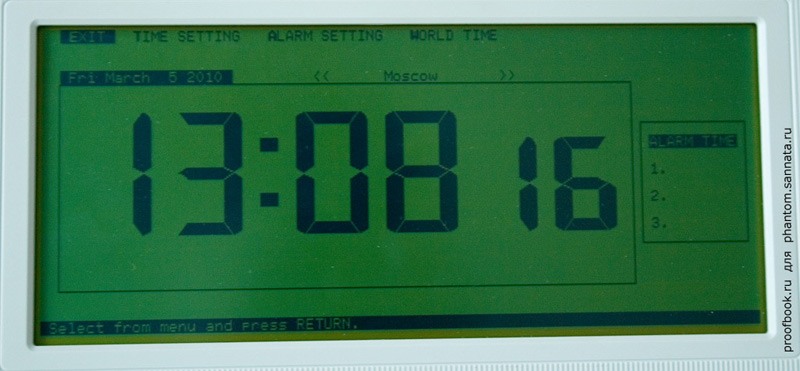

The next item, zero - file manager. Allows you to view saved files, look at a floppy disk, copy files, convert files to .txt format and from .txt to .wpt. You can print a list of files to the printer.

The menu item Disk Application, numbered with the letter A. By the way, you can navigate to a specific item by pressing the corresponding keys.
Using this menu, you can obviously run some applications from the disk, which ones I could not figure out.
And the last Set Up menu allows you to set up a connection to the printer, set a password, turn on fast charging mode and start the demo mode (also the demo is available using the Code + D combination from the main menu).


There is also a calculator available on the combination Code + S. No special calculator stands out.
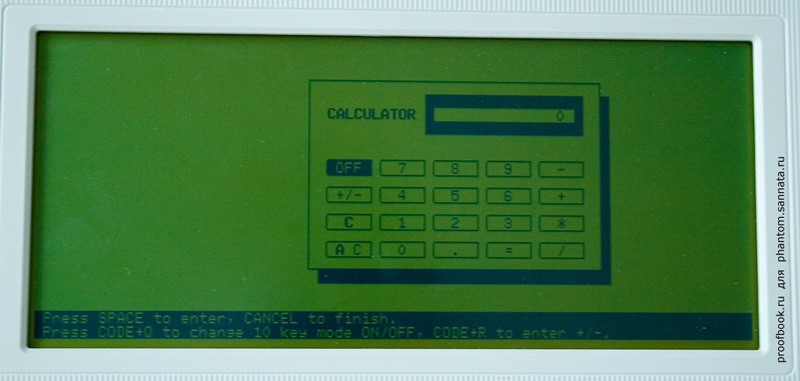
There is also a certificate (code + H), which describes in detail the main features of certain functions.
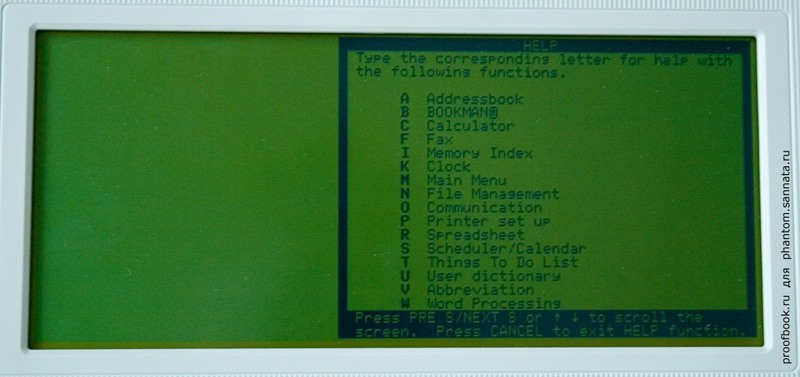
Screenshots of the demo mode:
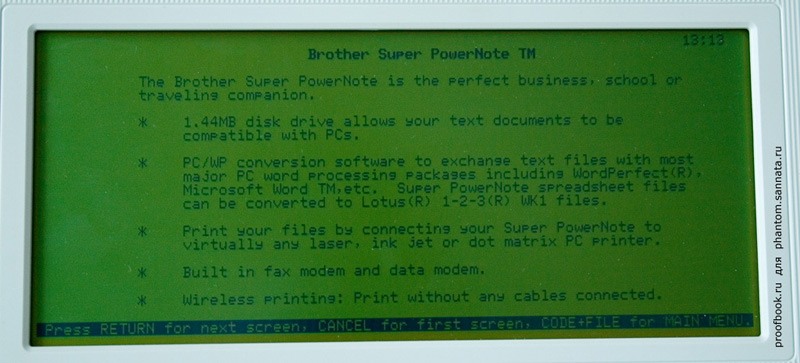


Here is a unit of 1996 release, which, like a laptop and can not be called, but still not just a notebook. Alas, I did not find any information about him on the Brother website.
Thanks for attention.
Ps Bookman cards can be found here - http://www.franklin.com/estore/expansion/
The user manual can be downloaded here (eng.): Ftp://ftp.brother.ca/MANUELS%20_%20MANUALS/English/WORDPROCESSOR/ (8800 analog 8500)
pps in my museum will soon be 50 exhibits, I will try to write about everything in a short time.

Not really a laptop, but I think many will be interested, especially since there is very little information on the network.
')
Part one. "Iron".

This is a business oriented word processor. With a fairly powerful text editor, table editor, calendar, etc. (more details later in the text).

He has the form factor of an ordinary laptop.
Specifications:
- 6 MHz processor (hd64180rf6x)
- 33KB of memory
- Built-in floppy-drive, working with 3.5 "floppy disks (1.44 MB)
- 9 inch monochrome display (22 by 80 characters)
- Parallel port
- Infrared port
- Modem
- Compatibility with multimedia cards Bookman cards
The left side carries: a connector for the power supply (9V), a modem RJ11, a toggle switch and a display contrast control. It is worth noting that there is no dimmer, and the screen has no backlight.

On the right fit only a floppy-drive.

On the back under the flip cover are parallel and infrared ports.

If you look closely, you can see small indentations in the body, just in the shape of fingers, for the convenience of wearing the device.
In addition to the label sticker, there are two compartments on the bottom. One for backup batteries (standard 3V CR2032). Under the second cover is a slot for Bookman cards. There may be various information on the cards (games including). Unfortunately, I do not have a card.


The compartment under the battery is located above the keyboard and should carry a NiCad battery with a capacity of 1400 mAh. I did not have the battery in the kit, so unfortunately I can not tell the time it allows you to use the device without access to a power outlet.

Under the display there is a large informative sticker, which lists the advantages of the “typewriter”. Frankly, the sticker adds a kind of toy to the device for the device, you know how toy notebooks are now sold to children.

It's time to see what's inside:
Unscrew the three screws, you can remove the keyboard.

Just a couple of screws and you can remove the top cover with a display. A thin flexible loop is used to transmit the image.

As you can see in the photo, a completely ordinary 3.5 inch floppy disk drive is used, on the motherboard classic connectors are nothing unusual.

All elements are located on one side of the motherboard. Separately, the Bookman card reader board is located and is connected to the main board with a loop.

The memory is soldered on the board, no additional connectors are provided for its increase, but it probably is not necessary.

Actually processor Hitachi 64180 (a distant large chip on the board).

Part two. "Software".
So, after turning on the device, a greeting appears on the screen.

And after a quick download, the main menu is available. Because no manipulator is provided, then movement between points is carried out using the navigation keys on the keyboard (arrows). By the way, they are unusual, in a row - to the left, up, down, right. In general, the keyboard layout is familiar qwerty, there is also a Code softkey, in combination with which some keys perform additional functions. There is a Cancel key and Menu. The backspace key is marked - BS, instead of the usual arrow.

As can be seen in the screenshot, only 12 menu items. Let's go over them in a bit more detail.
Under the first point is quite a powerful word processor. There are various text formatting options, setting page sizes, copying text in blocks, go to the next page, header and footer, and more. The document can be saved in .wpt format. It can also be printed immediately.

To work with a table editor, you must insert a floppy disk. Without it, the tables do not start, obviously due to the large file size. Various actions with tables are also available (sorting, etc.).

Files are saved in the .wpr format, they can also be converted to .wpt.
The next menu item is the address book. By filling out the address book, you can send faxes using contacts from it, and not enter the phone number when sending.

The fourth item is the fax send menu.

The fifth menu item is communication, where a TTY terminal and various connection settings, phone number, and file sending are available.

The following item is designed to work with maps bookman. Due to the lack of a card, it didn’t work out properly, the message about the absence of a card pops up, it is suggested to turn off the device and insert the card.

The seventh item is the calendar where you can add various tasks with reference to a specific date and time to within half an hour.

Such now popular todo lists are implemented in the eighth menu item. You can take notes, specify what needs to be done, the end date. You can also set a signal for a specific date and time.

What a business without world time, and time in general. The ninth point is dedicated to him. World time, alarm clocks, current time zone (city), date and time settings - that's it.


The next item, zero - file manager. Allows you to view saved files, look at a floppy disk, copy files, convert files to .txt format and from .txt to .wpt. You can print a list of files to the printer.

The menu item Disk Application, numbered with the letter A. By the way, you can navigate to a specific item by pressing the corresponding keys.
Using this menu, you can obviously run some applications from the disk, which ones I could not figure out.
And the last Set Up menu allows you to set up a connection to the printer, set a password, turn on fast charging mode and start the demo mode (also the demo is available using the Code + D combination from the main menu).


There is also a calculator available on the combination Code + S. No special calculator stands out.

There is also a certificate (code + H), which describes in detail the main features of certain functions.

Screenshots of the demo mode:



Here is a unit of 1996 release, which, like a laptop and can not be called, but still not just a notebook. Alas, I did not find any information about him on the Brother website.
Thanks for attention.
Ps Bookman cards can be found here - http://www.franklin.com/estore/expansion/
The user manual can be downloaded here (eng.): Ftp://ftp.brother.ca/MANUELS%20_%20MANUALS/English/WORDPROCESSOR/ (8800 analog 8500)
pps in my museum will soon be 50 exhibits, I will try to write about everything in a short time.
Source: https://habr.com/ru/post/95679/
All Articles